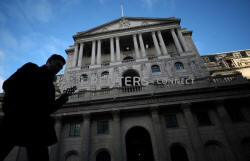Bank of England says failure to reach end-October Brexit deal would hurt
growth
 Send a link to a friend
Send a link to a friend
 [September 19, 2019] By
David Milliken and William Schomberg [September 19, 2019] By
David Milliken and William Schomberg
LONDON (Reuters) - The Bank of England said
Brexit uncertainty and slower world economic growth were increasingly
causing Britain's economy to perform below its potential, and that a
failure to reach a deal to leave the European Union by Oct. 31 would
worsen the problem.
All nine members of the BoE's Monetary Policy Committee voted to keep
rates on hold at 0.75% and reiterated their warnings that a no-deal
Brexit risked hitting sterling and damaging growth.
But their policy minutes for the first time gave an explicit warning
about the impact of a further Brexit delay, saying "entrenched
uncertainty" about the terms on which Britain would leave the EU would
also cause harm, albeit on a smaller scale.
Prime Minister Boris Johnson has vowed to take Britain out of the EU by
Oct. 31, without a transition deal if necessary. But parliament has
ordered him to delay departure if he cannot broker a fresh agreement
with the EU that parliament also backs.

"Political events could lead to a further period of entrenched
uncertainty," the BoE said. "The longer those uncertainties persisted,
particularly in an environment of weaker global growth, the more likely
it was that demand growth would remain below potential, increasing
excess supply."
Sterling <GBP=> and British government bond yields <GB10YT=RR> fell
slightly after the policy statement, which potentially opens the door to
a rate cut if Brexit uncertainty becomes chronic or the global economy
takes a sharp downturn.
The BoE described tensions between the United States and China as a
"trade war" for the first time and said this was doing material damage
to business investment worldwide.
"The tone of the discussion was slightly more dovish than in August,"
economist Thomas Pugh of consultants Capital Economics said.
Almost no economists expect the BoE to raise interest rates unless
Britain leaves the EU in an orderly way.
[to top of second column] |

A man walks past the Bank of England in the City of London, Britain,
February 7, 2019. REUTERS/Hannah McKay/File Photo

But unlike the U.S. Federal Reserve and the European Central Bank, the BoE says
it wants to raise rates gradually over the medium term, as long as a no-deal
Brexit shock to the economy is avoided and global growth perks up a bit.
In the event of a no-deal Brexit, policymakers repeated their view that all
policy options would be open, depending on the damage to growth and how much
inflation spikes from a likely fall in sterling.
BoE Governor Mark Carney - who is due to step down on Jan. 31 - has said his
personal view is that the BoE is more likely to need to cut rates after a
no-deal Brexit.
Earlier this month, he estimated that in a worst-case, chaotic scenario a
no-deal Brexit could reduce the size of the economy by 5.5%. On Thursday, the
Paris-based OECD predicted a 2% hit in the case of a more managed no-deal Brexit.
Brexit uncertainty already appears to be weighing on productivity growth in
businesses, and the labor market is no longer tightening as job creation has
slowed, the BoE said.
"Recently ... entrenched Brexit uncertainties and slower global growth have led
to a re-emergence of excess supply," the BoE said.
Britain's economy unexpectedly shrank by 0.2% in the three months to June, and
on Thursday the BoE said its staff now predicted a small bounce-back of 0.2% in
the three months to September, compared with the 0.3% it predicted six weeks
ago.
Inflation, which fell more than expected to 1.7% last month, was likely to stay
below 2% for the rest of this year, due to energy price regulations, before
rising in early 2020.
(Reporting by David Milliken and William Schomberg; Editing by Hugh Lawson)
[© 2019 Thomson Reuters. All rights
reserved.] Copyright 2019 Reuters. All rights reserved. This material may not be published,
broadcast, rewritten or redistributed.
Thompson Reuters is solely responsible for this content.
 |